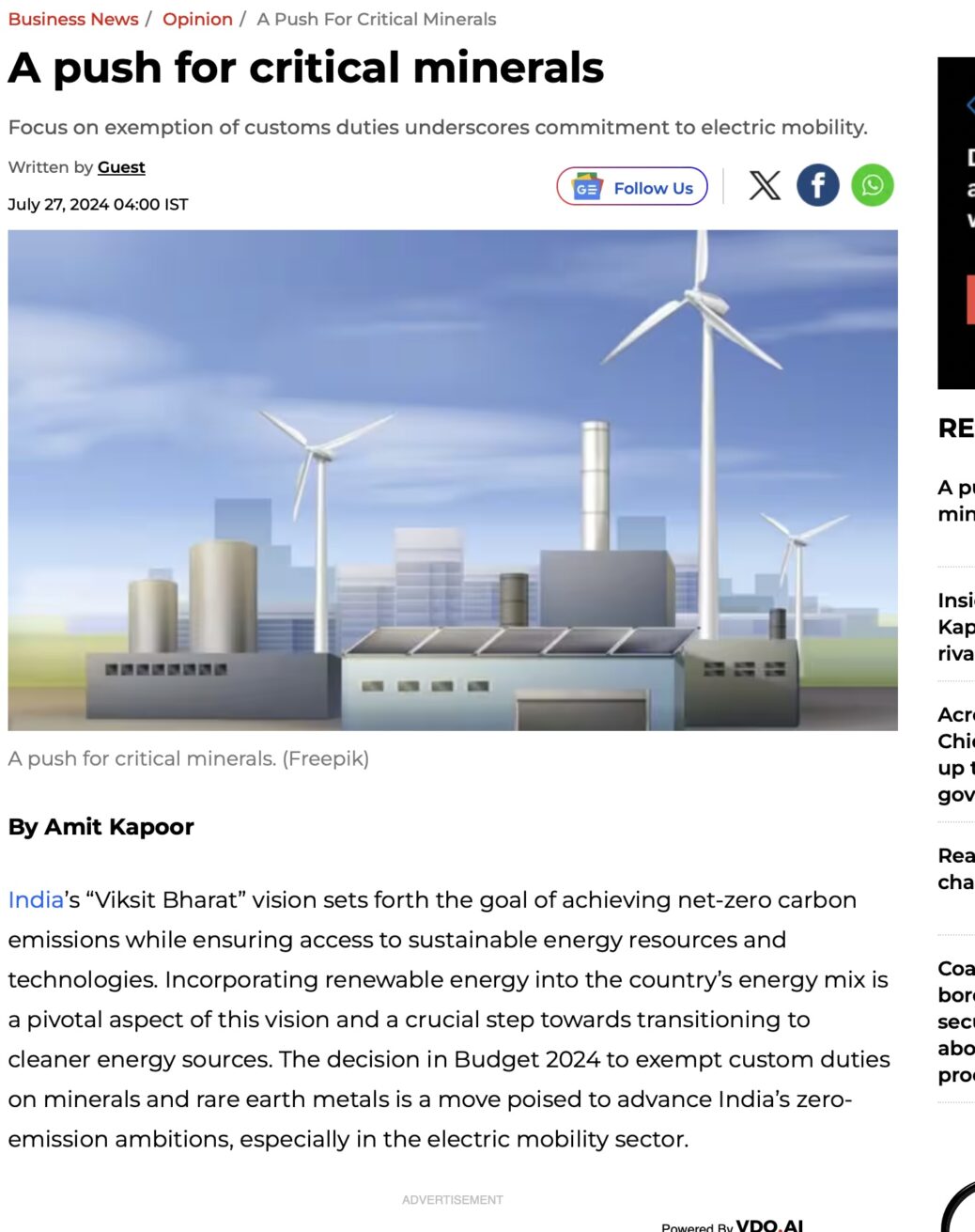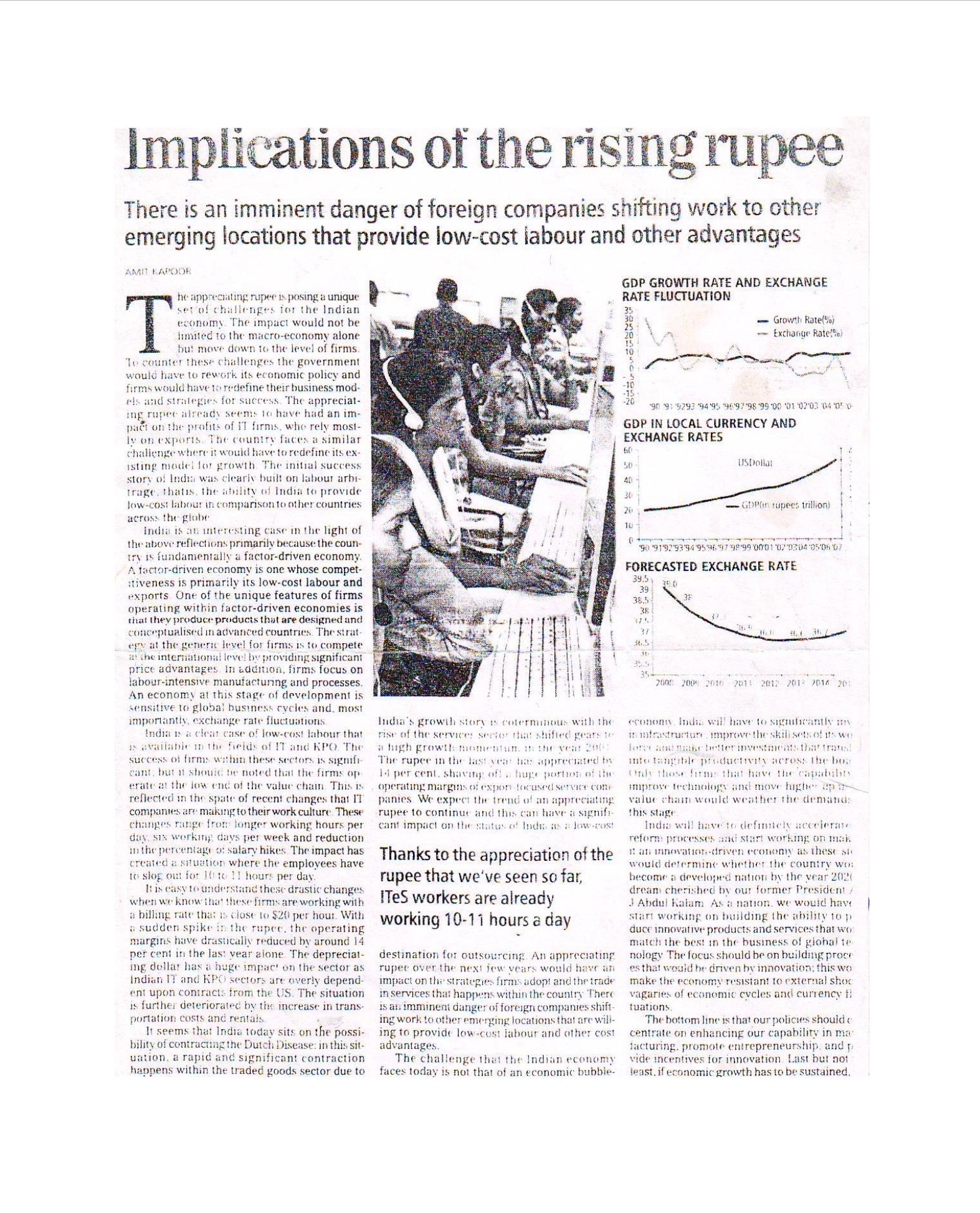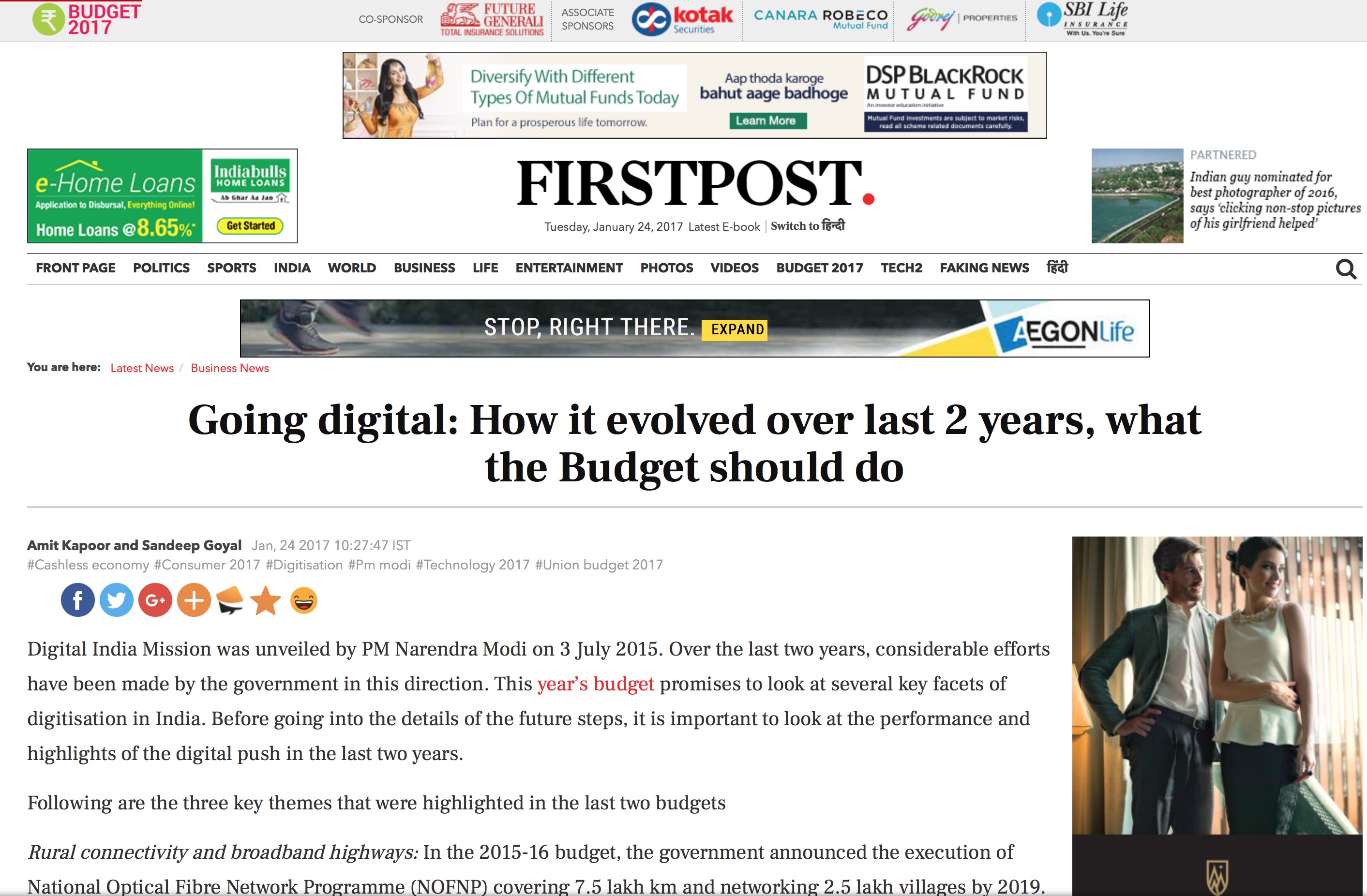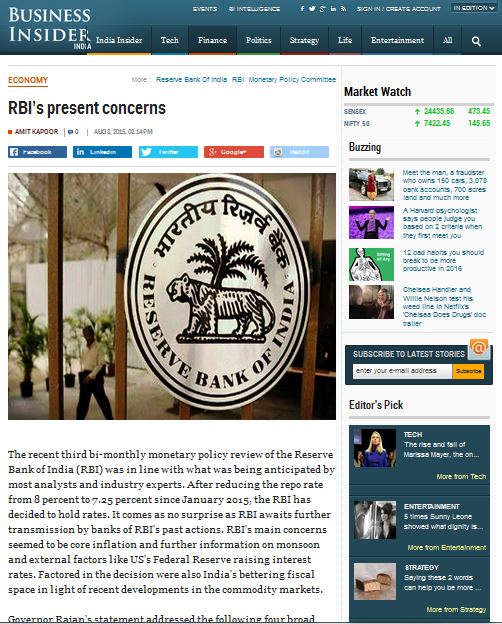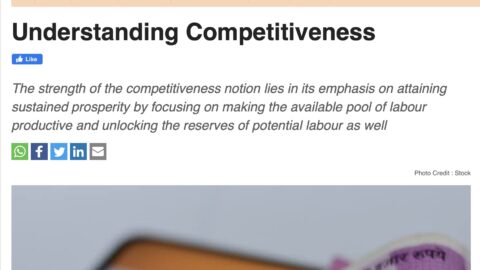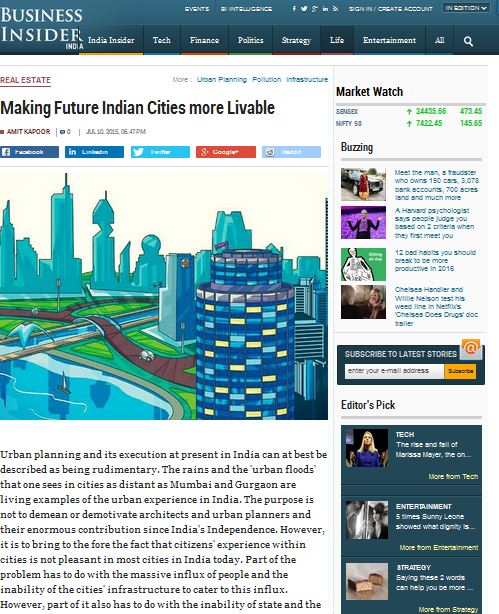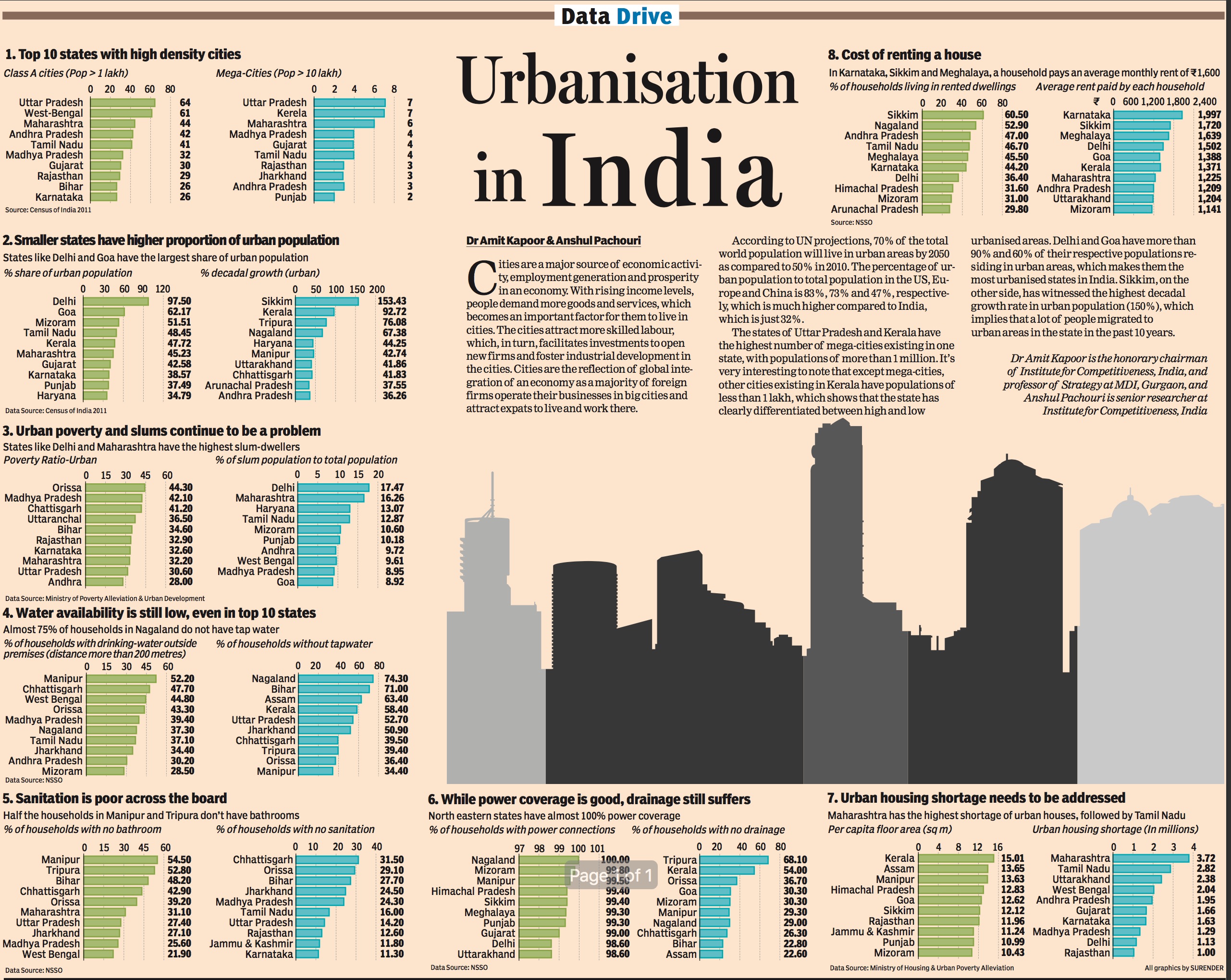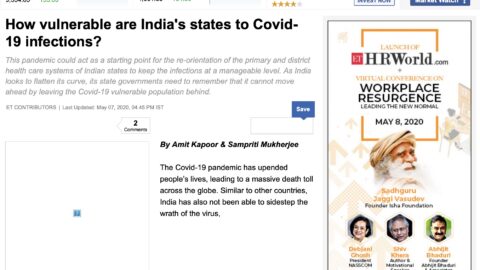by Amit Kapoor and Inputs from Nabha Sandip Joshi
India’s ‘Viksit Bharat’ vision sets forth the goal of achieving net-zero carbon emissions while ensuring access to sustainable energy resources and technologies. Incorporating renewable energy into the country’s energy mix is a pivotal aspect of this vision and a crucial step towards transitioning to cleaner energy sources. The decision in Budget 2024, to exempt custom duties on minerals and rare earth metals is a move poised to advance India’s zero-emission ambitions, especially in the electric mobility sector.
Economies around the world have acknowledged the critical role of Lithium in sectors pivotal sectors driving the shift towards clean energy, especially electric mobility, and energy storage. Given the importance of this mineral in sustainable practices, it is essential for India to procure lithium to ensure the country’s energy and economic security. The 2024 Budget recognises Energy Security as one of nine priorities and has proposed targeted customs duty exemptions for critical minerals, including lithium. This incentive recognises that effective lithium acquisition has immense importance in maintaining a stable pace of improvement in electric mobility transition due to its potential in accelerating Electric Vehicle adoption by lowering resource and production costs, incentivising manufacturing and encouraging innovation in electric mobility solutions.
India has been at the forefront of the Electric Mobility revolution, striving to incorporate sustainable energy practices that meet environmental goals and foster socio-economic growth. Central to the Electric Vehicle (EV) revolution is the lithium-ion battery, the most critical and cost-intensive component. Advancements in EV battery manufacturing by producing technologically advanced, cost and energy efficient Lithium-ion batteries has the potential to accelerate EV adoption. However, the sources of such minerals are geographically concentrated. For instance, China controls 79% of the global graphite supply, the Democratic Republic of Congo (DRC) holds 70% of the cobalt supply, China also dominates with 60% of rare earth elements, and Australia provides 55% of the world’s lithium. In addition, China dominates the processing sector and is responsible for processing 67% of lithium, 73% of cobalt, 70% of graphite, and 95% of manganese.
India is highly reliant on the procurement and refining of lithium and other critical minerals. In the fiscal year 2023, India’s lithium imports amounted to INR 23,171 crore, a significant increase from the previous year’s INR 13,673.15 crore. In 2020, India imported almost 450 million units of lithium-ion batteries. India’s energy transition is expected to lead to a significant decrease in the import bill for oil. However, the persistence of exponentially increasing lithium import could offset the anticipated decline in oil imports, resulting in a shift of import dependency from oil to lithium.
The transition to sustainable energy practices should not impose heavy economic burdens. Effective integration of sustainable and climate change strategies into national policy and planning is essential for India to reach its environmental goals while also upholding socio-economic stability and ensuring strong public finances. For this, making low-energy options more accessible and affordable for consumers is necessary. Along with this, it is crucial to build domestic capacity by supporting industries actively working towards a cleaner and more sustainable economy. In the realm of electric mobility, ensuring the availability and affordability of key resources like lithium is paramount.
India has initiated and is actively pursuing the exploration, development, and mining of critical minerals, especially areas of Jammu & Kashmir, Rajasthan, Jharkhand and Karnataka. The number of projects focusing on critical minerals rose from 59 in 2020 to 123 in 2023. Additionally, Khanij Bidesh India Limited (KABIL) establishes valuable government-to-government (G2G) partnerships with mineral-rich nations like Australia, several countries in Africa, and Argentina. These collaborations involve pursuing trading opportunities and making strategic acquisitions or investments in exploration and mining. However, until these exploration efforts yield tangible results, the waiving of customs duties on critical “reduce input costs, deepen value addition, promote export competitiveness, correct inverted duty structure, boost domestic manufacturing” as mentioned by our Finance Minister Nirmala Sitharaman in her speech. Forward-looking policies like the Production-Linked Incentive (PLI) scheme and Faster Adoption and Manufacturing of Hybrid and Electric Vehicles (FAME) are accelerating India’s journey towards electric mobility. The reduction in lithium procurement prices by reducing the custom duties will further this agenda and has the potential to accelerate the electric mobility pathway. It will enable industry players to focus on building capacity, and innovation, alleviating the burden of high upfront costs for consumers. This initiative should be strengthened by enhancing capacity building for the refinement of critical minerals, which will facilitate their effective use, enhance the battery value chain and reduce dependency.
The 2024 Budgets’ focus on exempting customs duties on essential minerals and rare earth metals is a strategic move that underscores India’s commitment to its electric mobility ambitions. The growing urgency for adopting sustainable practices is driving up the cost of transition. This exemption on custom duty for critical minerals will help mitigate these costs by removing cost barriers in securing eliminating minerals and thus ensuring a steady supply to critical sectors that play a crucial role in advancing India’s sustainability efforts.
The Budget recognizes India as a “climate-vulnerable” nation, and emphasises the need for adaptive strategies to meet environmental goals while advancing developmental commitments. It emphasizes the creation of robust, future-oriented infrastructures in key areas such as electric mobility, enhancing India’s global standing and reducing reliance on other nations for resources and technologies. These measures are designed bolster resilience and ensure sustainable growth, aligning economic progress with environmental stewardship for a more secure and prosperous future. As India continues to innovate and invest in critical mineral exploration and EV technologies, these measures will drive the country closer to a cleaner, more sustainable future, ensuring accessible and affordable electric mobility solutions for all.
The article was published with Financial Express on July 27, 2024.

